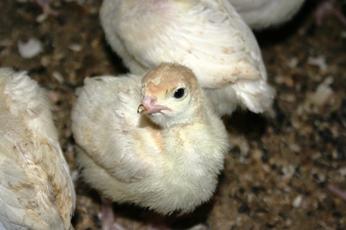In the shadow of continuing H5N2 avian flu outbreaks, a Minnesota turkey farm that was the first in the Midwest to be invaded by the virus is raising turkeys again, more than 3 months after the outbreak was identified, according to state officials and a media report.
The farm in west-central Minnesota's Pope County was restocked with turkeys 2 days ago, according to an Associated Press (AP) report quoting Dale Lauer, DVM, assistant director of the Minnesota Board of Animal Health (MBAH). The MBAH said the farm was cleared for restocking Jun 5.
Lauer told the AP that at least one other Minnesota farm plans to restock this week and that a few more aim to follow suit next week.
The Pope County farm was the first of 108 in Minnesota, the top turkey-producing state, hit by the H5N2 virus so far. Turkeys on the farm, a breeder operation, started dying in late February, and the outbreak was reported on Mar 5. More than 9 million birds in the state have been lost to the disease and resulting precautionary euthanizing of flocks.
Restocking is allowed only after a long series of steps that includes euthanizing of the birds, composting and removal of the carcasses, cleaning and disinfection of the facility, environmental sampling and testing for the virus, and a 3-week waiting period after tests are negative, according to Erica Gunderson, an MBAH communication staff member.
She said the composting step, in which poultry carcasses are mixed with other materials such as wood chips, typically takes about a month. As the carcasses decompose, the mixture heats up to about 140°F, which kills the virus, she said.
Pope and Lac Qui Parle are the only Minnesota counties where the state has lifted quarantines (bans on poultry movements) in the 10-kilometer control areas around H5N2 outbreak sites.
"We expect to have at least one other control area released this week, maybe a couple more," said Gunderson. She added that once a control-area quarantine is lifted, it may take a few days before the outbreak farm is allowed to restock.
Steve Olson, executive director of the Minnesota Turkey Growers Association and the Chicken , told the AP that one factor in the Pope County producer's decision to restock was that the farm is a breeding operation and the industry needs the turkeys it provides. He added that there aren't many other turkey farms in the immediate area, so there is less risk of the virus coming back from neighboring farms.
US to import egg products
In other developments, five egg processing companies in the Netherlands will soon begin exporting their products to the United States to help ease an egg shortage caused by the widespread avian flu outbreaks in the Midwest, the AP reported yesterday.
The step will be the first time in more than a decade that the United States has imported eggs from Europe, the story said. The imported egg products are expected to be used in commercial baking and processed foods.
Of the nearly 47 million birds lost because of avian flu, the AP said, about 35 million were layer chickens, which provided 80% of the eggs for the breaker market—eggs that are broken and then liquefied, dried, or frozen for use in processed foods like mayonnaise and pancake mixes or sold to bakeries.
Prices of egg products used by food manufacturers and bakeries have jumped more than 200% percent in the past month, and even large bakeries have been forced to buy eggs by the carton and crack them individually to continue production, an official with the American Bakeries Association told the AP.
The story said only Canada has been certified to sell liquid, dried, and frozen egg products to US companies in recent years. But with supplies running short, the US Department of Agriculture (USDA) renewed its approval of the Netherlands to export to the US, something it hadn't done since 2002. The USDA's Food Safety and Inspection Service determined that the Netherlands' food safety system continues to be equivalent to the US system.
The five Dutch companies will begin selling to US companies as soon as export certificate language details can be worked out, which should happen in a few days, a USDA official told the AP.
See also:
Jun 9 AP story on restocking of Minnesota farm
Jun 8 AP report on importation of egg products
Mar 6 CIDRAP News story on Pope County outbreak





















